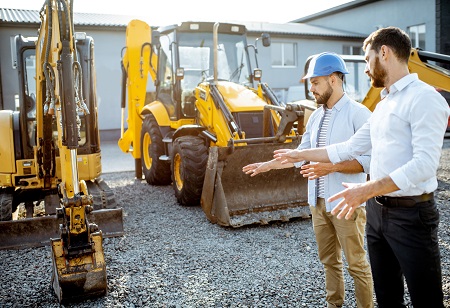The construction industry is one where time is of the essence. Delays could lead to unwanted situations, such as excessive expenditure. Construction professionals have developed ways to ensure they complete projects within the stipulated timeframe. One such way is the use of construction equipment. These tools quicken the execution of activities.
Are you looking to adopt construction equipment in your projects? Well, this decision has two options: buying or renting these tools. Both options are valid, depending on the surrounding circumstances. How do you know the ideal option?
This post gives a guide to assist you in making the decision. Read on for this insight.
It’d help to consider the following:
1. Short-Term Costs
Acquiring construction equipment requires funds. One of the costs you need to factor in is the initial price you’ll pay. In most cases, the initial price of construction equipment is high. It’d help to look at your budget or available funds.
If funds are limited, you should opt to rent. Renting is cheaper since you’ll only pay to use the equipment. Where your budget allows it, consider buying.
Considering the initial price of the construction equipment, you want to acknowledge that different vendors will sell the same tool for different prices. Therefore, compare the available price options to decide your ability to own the construction equipment.
For instance, you’ll find tractors listed on Machines4U. Such resources will help you make an informed decision.
2. Long-Term Costs
Long-term costs are part of your utilization of construction equipment. After acquiring the equipment, you have to consider maintenance, insurance, and other costs that arise later.
Your financial stability should help you gauge your long-term ability to maintain the equipment. If upkeep and insurance costs are high, highly consider renting. With renting, the maintenance burden isn’t on you but on the equipment’s owner.
On the other hand, if you can manage the long-term costs comfortably, proceed to buy the equipment.
3. Availability Of Spare Parts
Many companies manufacture construction equipment. Depending on your geographical location, you might find it challenging to access spare parts. It’s likely the case if your area isn’t one of those the said brand operates, and you must import the construction equipment.
It’s best to rent if spare parts availability is an issue. If you fail to do so, you’ll incur many importing costs, adding to your expenses. Plus, it can lead to delayed construction project completion if there are delays in shipping.
However, if spare parts are readily available, buying construction equipment is something you should consider. You won’t need to go to extra lengths to replace damaged parts, and neither shall there be delays due to delayed spare parts arrival.
4. Technology Advancement
Innovations happen every other day and touch different industries. Construction equipment also evolves, with better features and functions.
If you love to try out innovations on your project, buying construction equipment can be limiting. It wouldn’t be economical to purchase every advancement of the said tool.
Luckily, renting allows you to easily access the latest construction equipment to test out the new technology. All this is for your project’s benefit; there’s no limitation to what you can experience.
5. Disposability
Disposability refers to how easily you can dispose of the construction equipment should the need arise. You should consider it if you plan on selling the equipment.
Some construction equipment is easier to dispose of than others. Most construction equipment depreciates over time, which might make them challenging to dispose of. Suppose a given construction equipment is challenging to sell, or you’ll sell it at quite a low price compared to the acquiring price. Highly consider renting, especially if selling is your end-term goal.
On the other hand, if the disposal is no issue, proceed to buy the construction equipment.
6. Project Duration And Frequency
Your decision to buy or rent greatly depends on your project’s duration and frequency.
Buying is the most viable solution if your construction project is lengthy, probably a year or more. It’ll be cheaper compared to making regular payments for a year. This factors in that you’ll pay whether or not you’re using the equipment as long as the equipment is on your site. Yet if the project is short, consider renting; it’s cheaper
With project frequency, if you regularly use construction equipment, it’s more convenient to buy. The amount you’d pay for hiring will likely accumulate to the cost of buying the equipment. It makes hiring non-economically viable.
Buying construction equipment when you barely use it is a waste of investment. It’ll be idle most of the time due to the low-frequency use. Henceforth, please hire if you barely use the tools in your projects.
Conclusion
Deciding to buy or
rent building equipment can prove challenging without proper guidance. Nonetheless, this post lifts this burden by giving a guide on deciding between the two.
From the discussion, it’s clear that the choice highly depends on the viability of the decision based on the circumstances. This is what should guide you if you get stuck when deciding. That said, highly consider implementing this guide for easier and well-informed decision-making.
